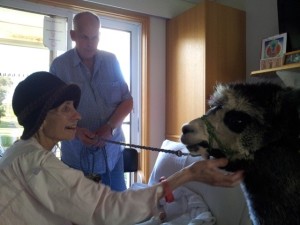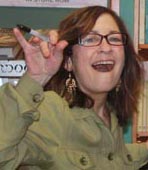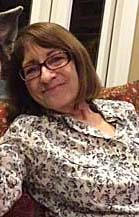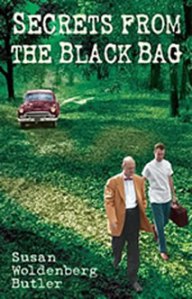My beloved wife Susan Starr Woldenberg Butler passed away, peacefully, surrounded by Buddhist prayer, on Saturday October 4, at midday in Canberra, ACT, Australia. In California, where most of her (Jewish) family still live, it was just at the start of Yom Kippur, the holiest day in the Jewish calendar, the day of atonement. It was also the start of the Sabbath.
Susan was born in Layfayette, Louisiana, USA, on May 4, 1948. Her father, Newton Glassner Woldenberg, had only recently returned from the Pacific theatre of World War II, where he had served as a soldier in both Australia and New Guinea. Her mother, Irene, had moved with Newt to the US South from Madison, Wisconsin, soon after their marriage, to work for his uncle, the businessman and philanthropist, Malcolm Woldenberg. Uncle Mal lived in a grand house in Napoleon St, New Orleans, and Susan loved to visit.
Susan lived in two other Southern cities, Bogalusa (LA), and Vicksburg, on the Mississippi river, still haunted by a great siege from the American Civil War. One thing from that time that Susan remembered was a frightening visit from the Klu Klux Klan. Her father had invited one of his employees (an African American) to his home; “we know you are Jewish, and we don’t do that here”. Perhaps this was in Bogalusa, reported as having in the 1960s perhaps the highest per capita KKK membership in America. “Klansmen held offices in city government. They assaulted and terrorized blacks — and whites who didn’t share their bigotry.”
Susan also remembered a trip by train to Los Angeles, in the 1950s, and the love and care her mother had shown in protecting her from exposure to polio, then a greatly feared epidemic affecting children.
(much to be added)
Susan and I met during Diwali (the Hindu festival that signifies the triumph of light over darkness) at a Buddhist guest house in the New Delhi suburb of Shanti Niketan (abode of peace), in October, 1985. By that time, Susan was working in Hollywood, for a TV station. She was on pilgrimage with fellow students of Geshe Gyeltsen, who had founded a Buddhist centre in Los Angeles. Geshla was to marry us in 1991.
I remember the fortnight in which I met her as if it was last month. I had a half hour meeting with His Holiness the Dalai Lama (at his meeting room in Dharamsala) only 2-3 days before I met Susan. Although I had attended teachings from His Holiness in 1982 when he first came to Australia, and again (for ten days) in 1985, when he gave the first Kalachakra teachings in Europe, this was my first ever face to face meeting with him. He was so generous with his time.
Later, Susan and I were to meet him twice, once in Los Angeles (just shaking hands) but also for about 30 minutes, again in Dharamsala, in 1990 (maybe October). The year before, he had become BODHI’s founding patron; we had asked him in late 1989, just before he was awarded the Nobel Peace Prize and became so very much in demand.
Susan is survived by her younger sisters, Jill and Anne, her mother Irene, a large extended family, and the author. Her father, Newt, who was a member of Mensa, died before I met Susan, in the late 1970s.
Susan was a talented author and editor. She had two books published in the UK, called Secrets of the Black Bag and Black Bag Moon. She was to sign the contract for a third, Black Bag Fix, but this was thwarted by her death. I am now in the early stage of negotiation with both this publisher and also the Royal College of General Practitioners, who published Susan’s first book.
When Susan second book was launched her stories were likened to that of the great A.J Cronin. whose writings (incuding Country Doctor) formed the raw material for the TV series Dr Finlay’s casebook. This was broadcast on the BBC from 1962 until 1971.
Susan also has two unpublished manuscripts. One, Just Add Nauseum, is a murder mystery set in Tasmania. The other is The Aftback Chronicles, the secret lives of stuffed animals. A leading character in this is the distinguished dyko-analyst, Sir Bligmund the black dog, whose patients range from the neurotic sniffer beagle at the airport to Rin Tin Tin. But even Sir Blggie pales in comparison to the real star, Sturgess Ursule, entreprenuer extraordinary.
Susan did a lot of editing. She was an active member of the Canberra Society of editors, who published a tribute in their October-November 2014 newsletter. Many of my articles, not to mention my powerpoint slldes, were improved, the latter especially visually, by Susan’s input. Susan also self-published four booklets, two of them cookbooks from the heart of Tasmania. These can still be purchased at the Tasmanian Wool Centre, in Ross, the historic village in the heart of Tasmania, near to where we lived from 1992 to 2008.
Susan was also a trustee of the Clifford Craig Research Trust, following a visit to Campbell Town by Dr John Morris, in 1992.
To be continued..
Professor Colin D Butler
University of Canberra and co-founder of BODHI

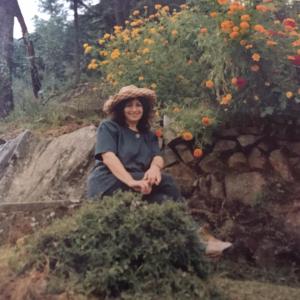 Susan from the mid or late 1980s (right) until her last week alive, in Clare Holland House, the Canberra hospice (below, with alpaca and the alpaca’s carer); below that Susan at one of her book launches, and soon before her diagnosis, visiting one of her sisters.
Susan from the mid or late 1980s (right) until her last week alive, in Clare Holland House, the Canberra hospice (below, with alpaca and the alpaca’s carer); below that Susan at one of her book launches, and soon before her diagnosis, visiting one of her sisters.